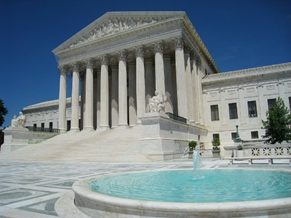
On February 20, 2019, the U.S. Supreme Court released its opinion in Timbs v Indiana, 586 U.S. ___ (2019) holding that the Excessive Fines Clause of the United States Constitution applies to state governments. The Eighth Amendment states that “[e]xcessive bail shall not be required, nor excessive fines imposed, nor cruel and unusual punishment inflicted.” The prohibition on excessive fines applies to federal cases but did not automatically compel state governments to comply. All nine justices, in a unanimous opinion, held that the Fourteenth Amendment does incorporate this important constitutional protection to residents of all States of the Union.
At issue in this case was Indiana’s civil forfeiture law. The defendant, Tyson Timbs, plead guilty to a controlled substance offense for which the maximum monetary fine was $10,000.00. However, the police seized the defendant’s Land Rover SUV at the time of arrest (valued at $42,000.00) and the state government instituted forfeiture proceedings on the basis that the vehicle was involved in trafficking heroin. The Indiana trial court denied the forfeiture action because allowing the state to seize an item four times the value of the maximum fine was grossly disproportionate to the crime and violated the Eighth Amendment. The Court of Appeals upheld the trial court, but both were reversed by the Indiana Supreme Court which held that the Eighth Amendment did not apply to state governments. The defendant’s appeal to the U.S. Supreme Court followed.
The State of Indiana relied on two arguments to uphold the civil forfeiture. First, they argued that the Indiana Supreme Court was correct in that there was no federal precedent applying the Excessive Fines Clause to the states. Second, even if the Eighth Amendment did apply to the State of Indiana, it does not address civil forfeiture actions as they are not technically “fines”.
The U.S. Supreme Court replied that, first, the Excessive Fines Clause will be held as incorporated to the states now and going forward whether or not it could be considered a “fundamental or deeply rooted” right in American history. Second, there is precedent in federal jurisprudence that civil forfeiture actions do fall under the Excessive Fines Clause because they are “at least partially punitive.” See Austin v United States, 509 U.S. 602 (1993). In sum, if the items or monies forfeited are grossly excessive compared to the criminal offense and the penalties available, then those actions will be struck down as unconstitutional.
The immediate effect of this ruling is that state governments will have to evaluate their civil forfeiture statutes to determine if they comply with the Eighth Amendment. Proposals are already being considered in the Michigan legislature concerning its own civil forfeiture laws. Under current rules, Michigan police are permitted to seize cash, cars or other property from persons suspected of criminal activity EVEN IF there is never a conviction of those people for any crime. For obvious reasons, these laws create a large revenue windfall to the State of Michigan when law enforcement is confiscating cash, cars and other items of significant value. A bill is now being considered in the legislature which would require a criminal conviction before the state can forfeit property worth up to $50,000.00.
This U.S. Supreme Court decision transcended politics to stand by the proposition that no one should be deprived of life, liberty and property without due process of law. The power to seize personal property by the state must be reined in when it exceeds established norms and common sense. Forfeiture actions exist to justly punish crime, not provide a back-door revenue tool to the government. These efforts by the highest court in the land to stand by these important rights, even when it opposes popular opinion, should be applauded.





